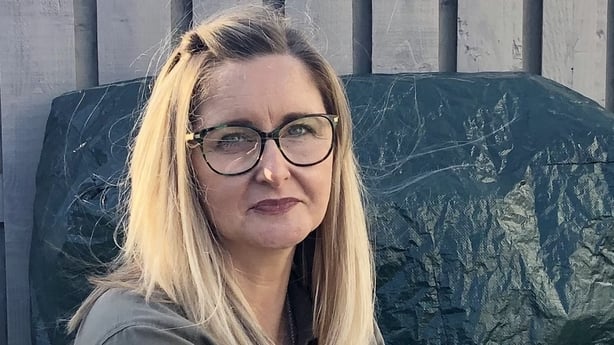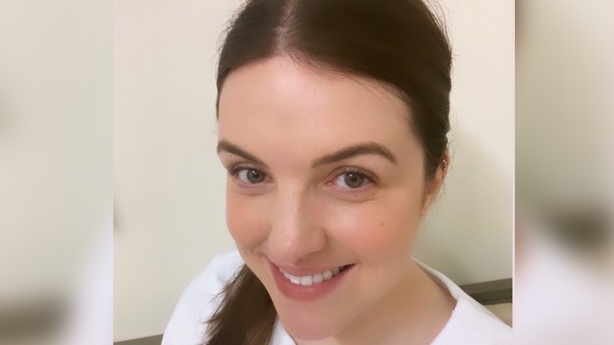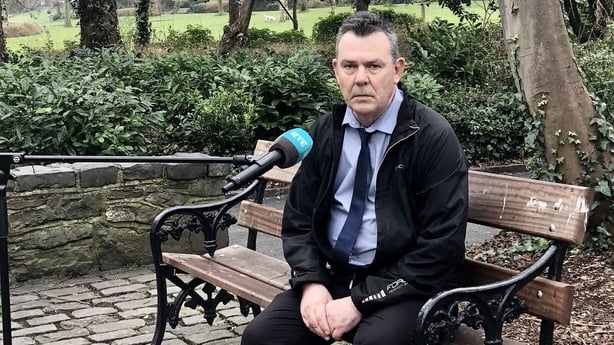Doctors say some people who contracted coronavirus almost a year ago, still have not fully recovered. While most people get better within weeks, a support group for people with Long Covid has called for greater understanding about their condition.
A UK study has estimated that as many as one in ten people who contract Covid-19 still experience symptoms 12 weeks on.
Dr Liam Townsend, Specialist Registrar Infectious Diseases St James's Hospital, said that almost a year on, they are still seeing many people who are still quite symptomatic, who have not returned to work at all or still are not back full time yet.
At the moment they are seeing patients who are predominantly suffering from fatigue and a reduction in exercise tolerance, which means they are getting breathless doing things they normally would not have been doing.
He said that this is impacting their day-to-day life and their ability to return to work.
"We are seeing other patients who have concentration issues or memory problems or often called brain fog."
According to Dr Townsend, the difficulty around Long Covid is that there is not one definition for it. He said that without a clear definition, it is hard to say who has it and who does not have it.
But he said that in its simplest form, Long Covid is the failure to return to full health following a Covid-19 infection. He said that it is a subjective diagnosis at the moment, one that is very broad.
Dr Townsend said that as we are only a year into this novel infection, this is a novel complication of this.
"So it's unsurprising that we don't have the silver bullet or the smoking gun that causes Long Covid. We don't know that and a lot more work still has to be done," he said.
Dr Townsend sees patients in the Post Covid Clinic in St James's Hospital.
He said that at the moment there is no national approach as such, and what they really need to make sure is that any patient who has this complication of Covid infection gets standardised care no matter what centre they arrive at.
He said that the best way to do this is to have a national programme or framework.
He said they are hopeful that that will be coming down the line soon, and that this would help the care given.
The data collected from the framework would allow doctors to answer some of the unanswered questions.
Doctors say some people who contracted coronavirus almost a year ago still have not fully recovered. While most people get better within weeks, a support group for people with Long Covid has called for greater understanding about their condition. | https://t.co/7saqsxJ75E pic.twitter.com/A1ZAHyfwko
— RTÉ News (@rtenews) March 3, 2021
Meanwhile, the founder of a support group set up for people who are still recovering from Covid-19 has said that members are experiencing difficulty in receiving care at the moment.
Claire Twomey of Covid Cases Ireland said that some people's employers have lost empathy and patience with them, and others are having issues around sick leave and sick pay.
Over 1,500 people are now in the group.
Ms Twomey said that there is a huge level of frustration among the group and that many are trying to argue their case with family, friends, employers and also with their medical teams.
She said that it is exhausting and not helping their recovery process.
Ms Twomey said there is an expectation from some people that this is just a fourteen-day virus and that people should be back to work and should be back to themselves.
She said treatment and care also varies across Ireland and that while that some doctors and nurses are up to speed on Long Covid, they find for others this is not the case.
She said that there are not enough Long Covid clinics in the country and there is not a general understanding or consensus of how to treat people who are experiencing ongoing symptoms after Covid.
The group has asked for guidance to be given for GPs and for more post-Covid clinics to be opened up.
The HSE has said that there is no national data at this time on how many Irish people experience prolonged symptoms, though there are some reports from individual centres.
In a statement to RTÉ News, it said that specific guidance on what has been referred to as the "long-tail" is presently under development both in Ireland and internationally.
It said longer-term observational studies will be required to understand the health consequences presently being attributed to post Covid-19 infection.
It also said that it has been in touch with and will be engaging a group of people who are suffering post-Covid symptoms.
The statement added that people who have been discharged from hospital following Covid-19 are followed up as appropriate by their team. It said that people in the community who are concerned about persistent Covid-19 symptoms should contact their GP.
The HSE said that a national approach to Long Covid is currently under consideration.
Sinead Sheerin from Dublin first started showing symptoms at the end of March last year.
The 45-year-old tested positive for Covid-19 the first week in Apri l and nearly 11 months on, she says she is still not back to her normal self.
"At the moment I still have a chesty cough, a pain in my back, fatigue, and brain-fog," she said.
Ms Sheerin also has no taste and everything has what she described as a "sewage smell".
"Any food I do eat tastes of … just a horrible, horrible taste. I can't smell toast, food cooking, I can't smell deodorant, perfumes or anything like that.
"I eat because I have to eat. I'm just not eating for enjoyment. Everything tastes rotten even now. I don't know if I will reach a point where I am going to get any better with this or this is my new normal. I don't know.
"My symptoms have improved a fair bit but it only takes a little bit of stress or if I do too much or walk too far and I get a setback. I had a really bad flair up over Christmas that was due to stress.
Ms Sheerin is now on inhalers which she said has helped her breathing.
"But you think you're having a good day and the next day is totally different, so you just don't know.
"I've no clue what the future holds.

She said that she is hoping to get back to work in a couple of weeks, and that she needs to get her life back. She said she is very grateful that her employer is so understanding.
"Covid has taken enough from me now."
It is not the only way Coronavirus has left its mark on her family, her father contracted the virus over Christmas.
Ms Sheerin said that he was a very fit and healthy man with no underlying conditions. However on 13 January, he died from Covid pneumonia.
"We weren't able to be with him when he passed away. We weren't able to grieve him the way we should have been able to grieve him.
"He was full of life and he was just snatched from us."
She said that she underestimated the impact that Covid-19 has on everybody - emotionally, physically, mentally, as well as the impact on family and friends.
"It really does have a big impact on your life and I never thought I'd be here today wondering if today is going to be a good day or a bad day."
Claire Twomey contracted coronavirus last March.
Initially her symptoms were mild, but for the last year she has been experiencing ongoing symptoms that have had a big impact on her life. These include losing her sense of taste and smell, migraines, fever and coughing.
A year on, she finally feels as though she has turned the corner.
"I've definitely come a long way. I'm still struggling with fatigue and I've had to make a lot of changes to my lifestyle but in the last few weeks most of my symptoms have subsided so I'm definitely feeling better in myself."

But she has made a lot of changes to get to this point, including leaving her 9-5 job.
"I'm not back running. I'm definitely not as active as I would have been on a daily basis. I monitor my activity on a daily basis because if I go too far, I will suffer a relapse," she said.
Ms Twomey said this means that a bout of fatigue which puts her back in bed for a few days and usually brings on a couple of symptoms as well.
She set up a support group on Facebook, and it now has over 1,500 members.
Ms Twomey said that more understanding about Long Covid is needed, as there is an expectation that people should recover fully from the virus after two weeks. Treatment and care also varies across Ireland, she said.
Ronan McGrath first experienced coronavirus symptoms last March.
He said he thought he was starting to get better but then a week later, he deteoriated and woke up in the middle of the night gasping for breath.
Mr McGrath got a Covid-19 test nearly a month later, however the virus was not detected.
He said that he was showing every symptom, and that his doctor put him on steroids for a month.

"But I still wasn't right," he said.
Eventually, Mr McGrath got an antibody test which came back positive for SARS-CoV 2.
Almost one year later, he said that he has still not fully recovered.
He said that there have been times where he was able to go out for a walk but then it would come back to hit him. He would suffer from tiredness and fatigue and while it would ease for a bit, it would then come back again. His breathing still is not normal, he said.
"I love to cycle and all that. I'd be able to do 20 or 30 kilometres no problem. And there is no way that I could do that now. There's not a chance that I could go for a run or anything like that.
"I feel as if it's an effort every day when I'm walking that I just can't breathe properly. It's not normal. There are times that I get really, really tired as well."







